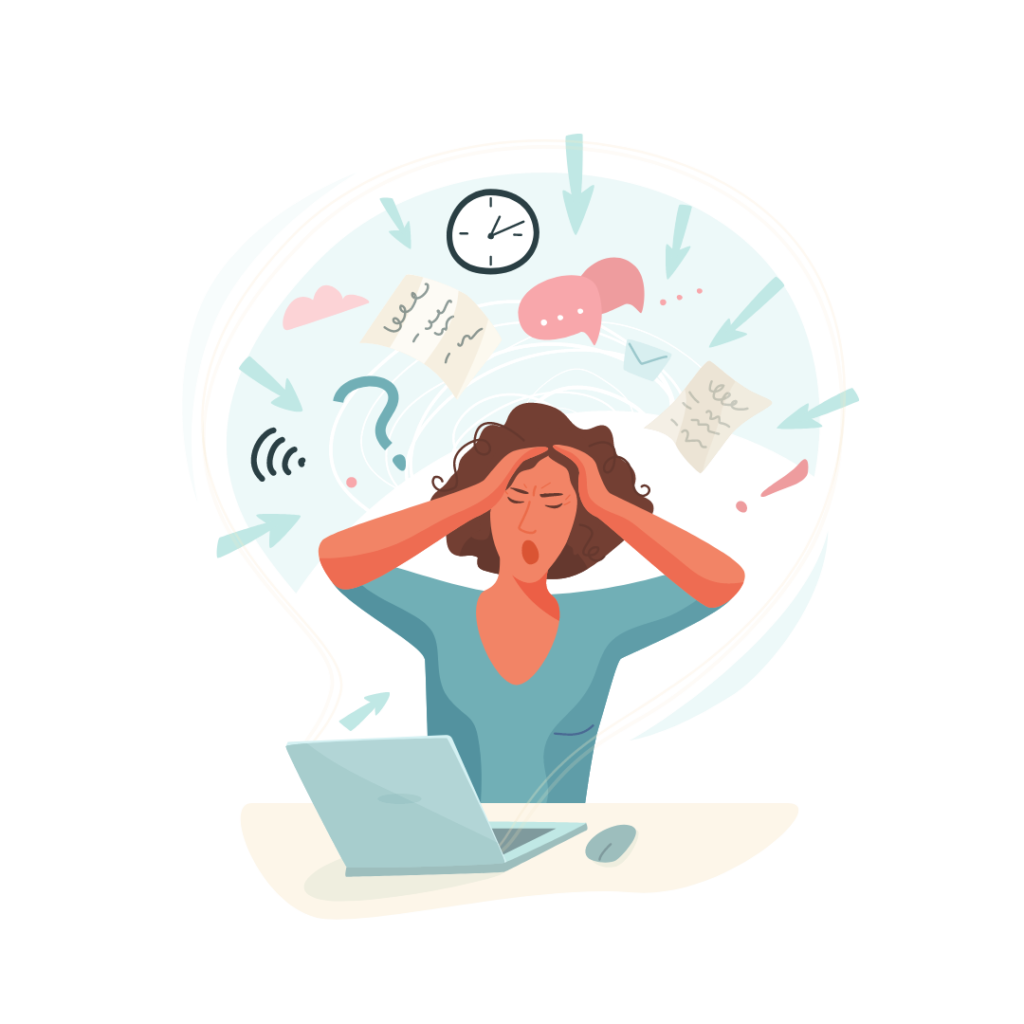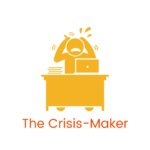The Why Behind Procrastination & How To Let That Sh#t Go!
Procrastination is a symptom of a deeper avoidance to something that feels uncomfortable. Over time, this symptom can become a conditioned response to anything that feels unpleasant, regardless of your willpower. When this type of deeper conditioning develops it can take more than your willpower to overcome.

This behavior strategy often develops over a period of time and leads to a number of other issues. Some of the side effects of procrastination may manifest as getting behind on work or school responsibilities, weight challenges, poor nutrition, overdue bills, mismanaged time and energy.
If you procrastinate, you may want to stop and ask yourself what exactly it is that you are “putting off” and if it is even worth it. The truth is, you learned to procrastinate and if you learned this skill you can unlearn it. Accepting that procrastination is a symptom of a deeper issue allows you to learn the story behind what the deeper discomfort is, and how avoidance was meant to help you in some way.

Once people gain this connection and understanding it is easier to release what might be outdated information creating fear and discomfort. This “unburdening process” allows you to unhook the illogical fear that has produced a negative loop of procrastination. As this happens, it opens up the ability to release the limiting beliefs that were keeping you stuck and now develop more effective ways to manage your time and energy.
Accepting that procrastination is a symptom of a deeper issue allows you to learn the story behind what the deeper discomfort is, and how avoidance was meant to help you
in some way.Nina Saurer, CCht
Today, I’m going to show you how to begin identifying some of the procrastination styles and the common stories that goes along with each.
6 types of procrastinators are as follows: The Perfectionist, The Dreamer, The Worrier, The Defier, The Crisis-Maker, and The Over- doer.
Let’s begin with…

The Perfectionist Procrastinator
Characteristics:
- Tend to put forth excessive amounts of time and energy to ensure everything they do is perfect.
- Tend to put off starting tasks due to a fear of failure and doubts about doing it the “right way.”
- Tend to see everything in life as things that have to be done, not necessarily what they want to do.
Strategies for Perfectionist Procrastinators:
- Strive for excellence rather than perfection
- Focus on what’s realistic rather than ideal
- Avoid “all or nothing” thinking
- Change your “have to”s to “want to”s
- Give yourself a time limit for completing a task
- Make a daily “to do” list that’s short and practical

The Dreamer Procrastinator
Characteristics:
- Tend to recoil from anything that might be difficult or distressing.
- Tend to be passive rather than active.
- Tend to pay little attention to facts or details, making it hard to focus on and perform difficult tasks.
- Tend to think of themselves as special people, for whom fate will intervene, making hard work and efficiency unnecessary.
Strategies for Dreamer Procrastinators
- Train yourself to differentiate between dreams and goals
- Develop the habit of thinking with “5 W’s and 1 H”: What, When, Where, Who, Why, and How.
- Change your wish’s, like to’s, and try to’s to will’s
- Change your someday’s and soon’s to specific times
- Plan each major project in writing, using a time line and specifying each step you will need to take
- Seek more interaction with other people

The Worrier Procrastinator
Characteristics:
- Tend to be indecisive and often fail to commit themselves to the specific decisions they do make.
- Tend to lack confidence in their own abilities, causing them to avoid or delay doing things.
- Tend to be dependent upon others for advice, reassurance, nurturance, and help
- Tend to have a high resistance to change, preferring the safety of the “known” over the risk of the “unknown.”
Strategies for Worrier Procrastinators
- Recognize making no decision, is, in fact, a decision
- Follow a two-step decision-making process: first commit yourself to the goal, then determine the steps you’ll take to achieve that goal.
- Change your I don’t know’s to One thing I do know is…
- Change your I can’t statements to compound sentences: I can’t…but I can…
- Each day, do at least one thing you’ve been consciously putting off
- Each week, do something that you’re generally uncomfortable doing
- Chunk down large intimidating projects into a collection of smaller, easier-to-manage tasks.

The Defier Procrastinator
Characteristics:
- Tend to see life in terms of what others expect or require them to do, not what they themselves would like or want to do.
- Tend to avoid expressing negative feelings; instead they convey those feelings by procrastinating.
- Tend to use procrastination as a way of challenging authority.
- Tend to be pessimistic in nature, undercutting their motivation to complete tasks in a timely manner.
Strategies for Defier Procrastinators
- Learn to view what someone else wants or expects as a request, not a demand.
- Mean what you say
- If you haven’t done something, own up to it.
- Choose to act rather than react
- Do what you know needs to be done
- Allow yourself to work with a team, not against it.
- Do something specific that will satisfy you because it’s done your way.

The Crisis-Maker Procrastinator
Characteristics
- Tend to first ignore the task, then feel intensely caught up in it, when faced with an undesirable task.
- Tend to dramatize situations, making themselves the center of attention.
- Tend to be easily bored and resist the “dullness” of doing things rationally and methodically.
- Tend to have a need to prove themselves by living on the edge.
Strategies for Crisis-Maker Procrastinators
- Identify other self-motivators besides stress.
- Choose to shift your thinking style from extreme behaviors and over-generalizing beliefs to moderating beliefs with facts and logic and specify what IS actually true in the present moment.
- Avoid overdramatic, polarized language
- When discussing a task or responsibility, try to focus on the positive or active, rather than the negative or reactive.
- Figure out methods for handling things so that you can more successfully manage recurring issues.
- Create your own motivators to change a boring task to one that offers more of a challenge.
- Understand that you may not feel interested in something until after you get involved in it.

The Overdoer Procrastinator
Characteristics
- Tend to suffer from low self-esteem, compelling them to take on more work than they can handle.
- Tend to have trouble saying “no” or asking for help.
- Tend to assume so many different responsibilities and roles that they easily get distracted from specific tasks and confused about priorities.
- Tend to lack true self-discipline, especially in regard to personal needs.
- Tend to find it very difficult to relax without feeling guilty or ashamed.
Strategies for Overdoer Procrastinators
- Acknowledge the difference between priorities and demands.
- Learn to offer self-validation instead of relying on the approval of others
- Focus your thoughts on how you are going to gain self-control and manage your time and energy instead of allowing things to control you.
- Practice saying “no” to others when it’s appropriate.
- Talk more about your options than your obligations
- Make and follow daily “to-do” lists that make the best use of your time and energy
- Enlist help whenever appropriate.
- Incorporate an ample amount of leisure activities into your life
Don’t worry too much about which type you are. Rather keep it simple and use strategies that most help you reduce procrastination and regain control of your time.
Keep it simple…
Identify the thought behind the habit.
You might find that your procrastination stems from re-prioritizing your workload. A person who delays an essential task for good reasons is not procrastinating. On the other hand, it becomes procrastination if you never get back to completing these necessary tasks or keep focusing on other functions to avoid the important ones.
Prioritize your tasks. You make sure to fill your day with tasks that aren’t urgent. Or you spend time reading the same emails several times a day with no decision on how to act on them. Pay close attention also if you begin an urgent task but then wander off to grab a cup of coffee and never come back to finish. Stay focused by allowing yourself a break after the task or if it’s a larger project, allow for 10 minute breaks at designated times.
Start where you are. A sure way to procrastinate is to spend too much time deciding whether or not to take action. Instead of debating, take action and get the work finished. Nobody ever regrets finishing an important task. The reason this tip is so practical is in how it helps you take the first step. The first step is usually the hardest. Once you’ve taken it, the rest becomes more straightforward.
Small steps lead to great adventures. Take the first step toward what you want to get done. It doesn’t have to be the most significant step you’ve ever taken – just get the ball rolling, and you’ll gain momentum.
Avoid assuming that willpower is the answer. The temptation to procrastinate can come from within you, but it’s also the result of your environment. In an environment in which you don’t feel supported, you don’t feel welcomed. In that environment, you don’t fully realize your intentions. Ask yourself, “What do I need to achieve my goals?” Then make a list of the steps you need to take to achieve those goals.
- Once you’ve figured out the steps, get started taking those steps, one step at a time. One step leads to another, and another, and soon you’re moving in the direction of your goals. Many people assume that willpower is enough. In addition, once your willpower runs out, it’s challenging to find the motivation to start back up again. That’s why it’s so important to think about your goals and plan the steps you need to take to achieve those goals. Take each step focusing on how the outcome will make you feel.
You can link procrastination to a lack of motivation. If you become preoccupied with your own goals, you’re less susceptible to procrastination. That’s why it’s always a good idea to set goals that motivate you personally.
It’s also a good idea to plan. Planning can reduce the need for willpower. Greater productivity will follow as you release the old limiting beliefs and rewrite the story that contributes to your success.
Also, remember that there’s no shame in asking for help. Many people procrastinate simply because they’re afraid to ask for help. If you’re struggling with habits that are seemingly out of your control reach out and see if one of my short-term coaching programs can help you step out of unhealthy patterns and into a more empowered version of yourself.
Schedule a Discovery Call and learn how NeuroCoaching can help you move from “maybe later” to “done!“

